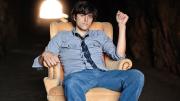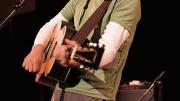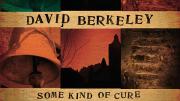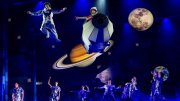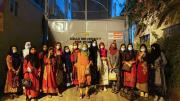The groom planned a surprise for his fiancée: a slideshow during the rehearsal dinner. A mix of songs accompanied images of their time together. The last song was one of her favorites: “High Heels and All,” by David Berkeley ’99. As it played, Berkeley himself entered and finished the song live. The bride-to-be loved it.
An established indie folk artist, Berkeley (www.davidberkeley.com) savors private concerts, but most of them aren’t serenades--they’re birthday, anniversary, and engagement parties, or intimate shows in museums, churches, and temples. “At a club, people quickly put the music into predefined boxes,” he says. “In some atypical performance spaces, you catch people without their walls up. They feel my songs more fully.”
Berkeley is about to release his fourth studio album exploring love, struggle, places, and moments. He has toured many times in the United States, the United Kingdom, and France. His “lustrous, melancholy voice” invokes shades of the late British and American singer-songwriters Nick Drake and Tim Buckley, wrote Jon Pareles of the New York Times. “As his melodies ascend to benedictions and consolations, the music shimmers and peals.”
Berkeley’s velvety tenor at times can leap cleanly into falsetto. In “George Square,” for example, from his forthcoming CD, he sings: “She was walking quite slowly all alone/All the lights in the windows were aglow/But the statues they were so silent/With the rain splashing their heads/How bad she wanted to hear them tell her which way was best.” Then he sings the first word of the chorus in falsetto: “Oh girl, don’t change your dress for me now/I am on your side.” The flash of falsetto heightens the desperation of the plea. Berkeley says it’s not a move he always plans, though he does like choruses to “lift” with energy: “There’s an inherent willingness to be vulnerable that allows me to do it. It’s not objectively flattering, and it certainly isn’t ‘manly.’ I do believe that it carries a different realm of emotions--softer, sadder, more humble, more pleading.”
Harvard classmates know him as David Friedland; Berkeley is his middle name. “My parents lived in Berkeley [California] before I was born in the ’60s,” he says. “They named me David Berkeley as a pledge to move back after having moved to New Jersey.” His parents did move back and, after five moves and two children in seven years, Berkeley and his wife, Sarah Davis ’99, have, too.
Berkeley began performing young--singing door-to-door with his babysitter, an Avon saleswoman--but he never studied music. At Harvard, he concentrated in literature, performed sometimes with the band of Tyler Gibbons ’99, and busked in alleyways. Managing Gibbons’s band led him into the music business. Today he performs solo, in a duo with trumpet and banjo player Jordan Katz, or in a trio.
He’s just finished a book, 144 Goats and a Guitar, a collection of essays exploring the roots of songs on his new record, Some Kind of Cure. In it, he describes his writing process: “Songs begin as lines jotted into a book I carry. Often they start from something quite small: a strange or uncomfortable story or situation, perhaps just a mood or a hope--a wish for escape, a need for comfort, an overwhelming surge of love for my family, a burning desire to make things in their lives okay.”
A big break came when he was hired to write his song “Fire Sign” to fit the climactic moment in an episode of the CBS series Without a Trace. The layering of Berkeley’s delicate finger picking over a horrifying onscreen situation--a hanging boy, his feet still kicking--added suspense, and Berkeley’s slow, sorrowful tenor haunted the scene. The dramatic placement of the song propelled his music into the mainstream. Though he wasn’t credited, viewers discovered that he was the singer-songwriter and bought 500 CDs that night.
Berkeley has independently produced and released five albums, most recently Strange Light. Some Kind of Cure is due out in January. “At this moment I’ve said all that I’ve had to say,” he says. “It’s a great feeling. I’ve never had that before.” Still, he won’t stomach being called successful. “If I were looking for money and some sort of conventionally measurable level of success, I’d be an idiot to do what I’m doing.”
His fans have bought more than 30,000 CDs, and donated at his website to defray the production costs of the new album. And Berkeley gives back--in personal answering-machine messages, phone serenades, and cover songs. And in private concerts.
